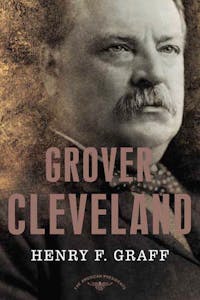Grover Cleveland
The American Presidents Series: The 22nd and 24th President, 1885-1889 and 1893-1897
 Download image
Download image
ISBN10: 0805069232
ISBN13: 9780805069235
Hardcover
176 Pages
$34.00
CA$46.00
In this volume, renowned presidential historian Henry F. Graff traces the life of an exceptionally significant chief executive who never curried the people's favor, yet won it just the same.
When Grover Cleveland took office in 1885, one world was ending and another one emerging. The signs were everywhere: transcontinental railroads were still being built, the telephone was still a novelty, the light bulb had just been invented. In the political arena, Cleveland bridged the time between the old and the new—from the age when Congress dominated national affairs to the modern era, when affairs became more sharply focused around the president.
If Cleveland is less well-remembered today than he ought to be, it is because he brought to the White House not flamboyance and bluster but quiet dignity and integrity. He came to office with no program, no pretence, no military record—and no wife. Self-reliant to a remarkable degree, he was the kind of man, a friend said, "who would rather do something badly for himself than to have someone else do it well." If his public presence was ordinary and even colorless, his fellow citizens found these characteristics to be just what they wanted. He was, in fact, the only Democrat elected twice in the three-quarters of a century between the tenures of Andrew Jackson and Woodrow Wilson. Cleveland fitted perfectly his decade in power, conducting the presidency with one telephone and only rudimentary electric lighting, and sometimes answering the door himself. He ignored the press—the last president who dared to do so—and went his own way, relying on his instincts and his political courage to define his public policies. In an era marked by harsh economic times and labor disputes, Cleveland struggled mightily against the political culture of his time, and his policies are often viewed as severe by modern critics.
Reviews
Praise for Grover Cleveland
"Grover Cleveland is the best Unknown President. To millions he is remembered only for having served two non-consecutive terms in the White House. But in three elections he received the majority of the popular vote—a record exceeded only by Franklin D. Roosevelt. Why he remains so dim in the public mind requires a satisfactory explanation. So, it is an attractive challenge for an historian to look closely into how this unglamorous man, who was plain in face and manner, and spoke very ordinary words from the public platform, managed his uncommon achievement. Americans need to know, too, as I have rediscovered for myself, what it was like to have a president without charisma, who acted with principle and probity according to his conscience—and also without opinion polls—and engraved his name on a formative period in presidential history."—Henry F. Graff on Grover Cleveland
"Books on minor historical figures are often heavy going, but in this slim volume, part of the American President series, historian Henry F. Graff does a workmanlike job."—Mike Oppenheim, American History
"An absorbing study . . . deftly sketched . . . Graff points out Cleveland's political domination of his time: a politician of integrity, sincerity, and decency at a time of widespread political corruption."—Kirkus Reviews
"The basics of Cleveland's life and career are presented with workable, even admirable, concision."—Brad Hooper, Booklist
"As part of the American Presidents series under the editorial direction of Arthur Schlesinger Jr., distinguished historian Graff offers new insight into a President who is often overlooked . . . This slim volume is a valuable edition to the literature on the Presidency and is a compelling argument for taking Cleveland seriously as a President."—Michael A. Genovese, Loyola Marymount University, Library Journal
Reviews from Goodreads
BOOK EXCERPTS
Read an Excerpt
1
Early Years
Cleveland was baptized Stephen Grover, but he never used the Stephen after he grew up. He was the fifth of the nine children and third son of the Reverend Richard Falley Cleveland and Ann Neal, a native of Baltimore....
Listen to an Excerpt from the Audiobook
Download MP3MEDIA
Watch
Grover Cleveland by Henry F. Graff--Audiobook Excerpt
Listen to this audiobook excerpt from Henry F. Graff's biography Grover Cleveland, part of The American Presidents Series. Though often overlooked, Grover Cleveland was a significant figure in American presidential history. Having run for President three times and gaining the popular vote majority each time -- despite losing the electoral college in 1892 -- Cleveland was unique in the line of nineteenth-century Chief Executives.
Share This


